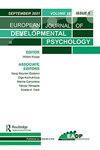Even less visible: disadvantaged children in disadvantaged countries
IF 1.9
4区 心理学
Q3 PSYCHOLOGY, DEVELOPMENTAL
European Journal of Developmental Psychology
Pub Date : 2022-12-15
DOI:10.1080/17405629.2022.2157398
引用次数: 0
Abstract
In this paper, we have a quick look at the profile of developmental research in terms of its study samples, and then turn our attention to the findings of research on the COVID-19 pandemic and climate change, suggesting a notable increase in the number of people experiencing significant economic difficulties and a widening gap between the wealthy and the poor. While this is obviously a cause of concern for scientists, practitioners and policymakers, we suggest that the digital revolution which accelerated even more with the COVID-19 pandemic may open new ways to support healthy development and psychological wellbeing in socio-economically or developmentally disadvantaged populations. Moreover, acceleration of the digital transformation may also allow us to study the human mind and behaviour in countries economically categorized as 'under-developed' or 'developing', and under-represented in psychological science. Taking the recent advancements as a base, we contemplate the possibility that major technological changes facilitated by the recent COVID-19 pandemic might allow us to meet the scientific and applied goals of psychology more successfully. (PsycInfo Database Record (c) 2022 APA, all rights reserved)更不明显的是:贫困国家的贫困儿童
在本文中,我们从研究样本的角度快速浏览了发展研究的概况,然后将注意力转向关于COVID-19大流行和气候变化的研究结果,表明经历重大经济困难的人数显着增加,贫富差距正在扩大。虽然这显然是科学家、从业者和政策制定者关注的一个问题,但我们认为,随着COVID-19大流行加速的数字革命可能会开辟新的途径,支持社会经济或发展弱势群体的健康发展和心理健康。此外,数字转型的加速也可能使我们能够研究经济上被归类为“欠发达”或“发展中”国家的人类思想和行为,以及在心理科学方面代表性不足的国家。以最近取得的进展为基础,我们考虑最近新冠肺炎大流行推动的重大技术变革可能使我们更成功地实现心理学的科学和应用目标。(PsycInfo数据库记录(c) 2022 APA,版权所有)
本文章由计算机程序翻译,如有差异,请以英文原文为准。
求助全文
约1分钟内获得全文
求助全文
来源期刊

European Journal of Developmental Psychology
PSYCHOLOGY, DEVELOPMENTAL-
CiteScore
3.70
自引率
0.00%
发文量
35
 求助内容:
求助内容: 应助结果提醒方式:
应助结果提醒方式:


